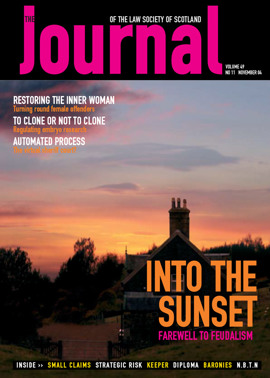View from Holyrood

It’s strange being a contributor rather than a reader of this Journal. However, having retired from practice as a solicitor shortly after election I now find myself covering the Justice portfolio for the SNP. Rather than responding to what has happened in the legislature I am in the position of commenting on what is happening there.
Moving from lawyer to politician was like shifting from the frying pan into the fire; from a derided profession to a despised business. Absence makes the heart grow fonder but I see no reason why lawyers should apologise for the work they do. Whether court, conveyancing or commercial, the overwhelming majority do an excellent job for their clients, ensuring that important matters whether financial or personal are addressed and rights and obligations met. If lawyers didn’t exist then society would need to invent them. Politicians are lobbied incessantly by an organisation attacking crooked lawyers. As both a lawyer before and a politician now, I am yet to meet a member of the profession who does not seek or insist on action being taken against those that bring all into disrepute. Whatever a few malcontents may say, lawyers need not hang their heads in shame but can hold them high.
The Parliament has now convened in its new home. Irrespective of arguments over costs, there is an acceptance that it offers a second chance to deliver what the people of Scotland wanted when they voted for it. What it does need not be earth-shattering, but it must be an improvement and add tangible value to our lives. Such as, perhaps, the Tenements Act so recently approved. In itself it is hardly the legislation that turns the nation, never mind the earth, on its axis. However, it is of significant importance to many who reside in such accommodation. It is action that the profession has highlighted the need for over many years. In the absence of the Parliament, doubtless change would have required to await some Law Reform Act in decades to come. It isn’t big in the grand scheme of things but it does make a discernible difference. The profession needs the change and the politicians need to be seen to be effecting change.
Another piece of legislation that is meandering its way through the legislative procedure is the Emergency Workers (Scotland) Bill. This is a piece of legislation with worthy intent. After all who can possibly object to the protection of paramedics or firemen going about their business? That said, these matters can already be libelled as aggravated offences and sheriffs and procurators fiscal advised of the serious view taken of such incidents. The Executive has decided though to proceed with a specific offence, as it is entitled to. In that I will seek to support, not hinder. However, if such legislation continues unabated then consideration sooner rather than later needs to be given to codification. Legislators bring in many well intentioned laws but it’s the implementation that is the problem. Time will tell.
Finally, there appears to be something brewing on the financial limits for small claims and summary cause actions. Motions are now being lodged by individual MSPs calling for the threshold to be raised or personal injury excluded. I doubt that they are doing so without some hint or suggestion from the Executive that change is in the offing. Clearly, there has to be change. The limits are dated and eroded by inflation. The warnings of the dangers of increasing them without considering the ramifications for personal injury cases in particular are correct. This should not simply be rushed through with a statutory instrument uprating the limits. There must be a proper debate on the nature of justice and access to it for smaller financial claims. Given that the cost of a sheriff, according to a parliamentary answer I received, now amounts to £159,000 per annum, do we want them deciding on whether someone’s plumbing work was poor, or whether I signalled or not as your car ran into the back of mine causing £200 worth of damage?
There must be access to justice but also at an affordable level – especially for minor claims. How courts are run, staffed and operated at that level needs to be decided. It must not be foisted on either politicians or the profession with a take it or leave it increase in thresholds through a statutory instrument. This is a debate that must take place not just in the chamber but in the profession.
Kenny MacAskill
In this issue
- Drafting consumer contracts
- Virtual firms: transactional learning on the web
- Ignorantia juris: it's all Greek to me
- Sheriff Court Rules Council consultation paper
- The Clinical Trials Directive - a summary
- Guarding the inner sanctum
- Neighbours in the global village
- Family law: is it the path for you?
- From sunset to sunrise
- What next for conveyancing?
- An ethical minefield
- Shredding the evidence
- Robbing the poor?
- Our dynamic profession
- A wider angle
- Keep the eye on the ball
- A rough guide to becoming a partner
- Rediscovering hope
- Sharpen your pencils
- Significant other
- Too far or not enough?
- Chipping away the infringers?
- View from Holyrood
- Website reviews
- Book reviews
- The Registers and the Appointed Day
- Feudal law: not just a relic
- Birth of a register






